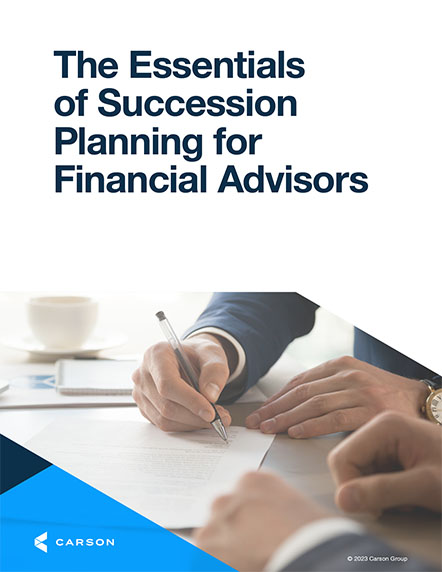Buying another advisor’s book of business is a way to immediately grow your assets under management and add new specialty services to your practice.
If you’re considering an acquisition, chances are you’ve already got some idea of what you’re looking for, the valuation process for setting a price and how you would integrate the two firms. Now it’s just the small matter of finding a financial advisor book of business for sale.
Where do you even begin?
The typical advisor might only acquire one or two other practices during their career, so most don’t have significant experience with this process. Fortunately, finding a deal partner can be easier than you think with the right approach. There are a few strategies for finding a financial advisor book of business for sale, with different strengths and weaknesses.
1. Apply Through Listing Services
When advisors think of ways to find a financial advisor book of business for sale, they typically think of using a listing service. It’s possible that’s what you were looking for when you came across this article.
FA Match, FP Transitions, Succession Link and Successions Resource Group (SRG) are four examples of major players in this space. Some websites let you browse listings for free, while others require a subscription.
The main advantage of using a listing service is the immediate access to books of business on the market. You don’t have to wait for advisors to make up their minds because they’ve already decided to sell. These websites generally have thousands of listings to sort through.
The downside is that they’re flooded with competition. You might find a book of business with a lot of potential, but when you apply, you’ve submitted application or inquiry No. 85. While you might be a perfect match, all it takes is one small misunderstanding in your application and you’ll get denied without even a chance to speak with the other advisor.
The key to success with listing services is volume. You need to keep applying and hope to luck out by connecting with the right seller. In addition, these services are better for smaller acquisitions, as larger deals usually go through more personal marketing channels.
2. Market to Advisors Looking to Sell
Cold marketing directly to advisors could work, but only if you use the right approach. You’re competing against all the aggregators, large broker-dealers and well-known firms that are also trying to get in front of these advisors. Not to mention, the cost of broad-based marketing outreach can get expensive quickly.
If you’d like to use this strategy, I recommend focusing on quality over quantity for your marketing plan. Stay local and use a personalized, handwritten note. This works especially well if you have some connection with the other firms, like a former client moved over to them or you’re in the same networking groups. Be sure to mention these details in your note.
More often than not, other advisors will reply to this personal touch, especially if they recognize your firm’s name. On the other hand, a generic mailing just doesn’t have the same impact.
Remember that when someone sells their firm, they are likely parting with a business they’ve built over the course of an entire career. It can be a highly personal experience, and the more you’re able to show your personality, the more trust you build.
3. Check With Your Broker-Dealer or OSJ
If you’re part of a broker-dealer, it likely offers its own internal listing service for advisors looking to buy and sell practices. There’s no paid subscription needed. You can list yourself as a potential buyer while checking the listings of interested sellers.
One advantage of working with your broker-dealer is that there’s a lot less competition for each financial advisor book of business for sale. You might be one of 10 or 20 people inquiring about a practice for sale, versus competing with what feels like the whole universe on a listing service.
If you buy a practice through your broker-dealer, the transition is much simpler because you’re both already on the same system. You won’t have to repaper all the accounts or make any major adjustments for the clients.
The downside of the broker-dealer is that the market is much smaller. You might only see 20,000 listings nationwide, versus the 300,000 on a listing website. This approach works if you’re targeting a narrow search inside your existing market.
Your Office of Supervisory Jurisdiction (OSJ), which is your broker-dealer’s regional branch office, takes this another step further by being even smaller. It’s a much tighter-knit community of perhaps 300 to 400 advisors. You likely already have an existing relationship with many of them by going to the same meetings and conferences, and having clients who know each other.
The network is so small that you won’t have many options of practices for sale, but if you do find one that’s a fit, it’s a much easier sales process and transition given your shared history and likely geographic advantages.
4. Get Referrals From an RIA Business Development Team
Business development services like Carson Group can have their own M&A divisions that are actively looking to acquire books of business. Since not every seller is a fit for Carson, we refer those deals to our existing partner advisors.
This approach can work well if you’re using the services of an RIA business development team or if you plan on joining as a Carson partner in the future. Not only can we help you find advisors to acquire, we’ll also work with you to prepare both firms for the deal so it goes smoothly.
If you’ve already partnered with Carson, reach out to our sales team to get pre-qualified for future deals and start receiving referrals.
5. Build Relationships With Those in Your Community or Niche
If you’re willing to put in the time, building local relationships in your advisor community and niche can work extremely well. The key is to let people know you’re interested in buying one day.
I had one colleague who every time he met a new advisor, he would introduce himself and say “Nice to meet you, do you have a continuity or succession plan in place?” That might seem overly forward, but it worked. He closed roughly a dozen acquisitions over 15 years.
Think of where advisors in your community congregate, whether it’s at the golf course, a wine bar, a popular charity, etc. It could also be at industry events. For example, product wholesaling events usually include some sort of dinner or cocktail hour that’s not part of the presentation, where you can strike up this conversation. In particular, watch out for advisors approaching retirement age.
If you’re interested in community advisor-exclusive events, we host regular roundtables around the country where local advisors get together to share what’s working, what’s not and what the future holds for their firms.
As you meet interested advisors, suggest a lunch to talk more. This is a chance to get on their radar and hash out the details of a potential deal, like whether they would want to stay on as partners for a few years after the acquisition. If you’ve completed any deals in the past, mention them to build credibility.
6. Join Advisor Events
Large events could be a great way to meet other advisors from around the country, such as Carson’s Excell conference in Nashville. At a national conference, it’s not just 30 advisors in a room like at a local event, but rather 1,000. You’ll have plenty of face time as you sit together for meals, at breakout sessions, connect in the hallway and stay in the same hotel. Since you’re on a neutral turf, the discussion can feel more comfortable for both sides.
This approach makes sense if you’re OK expanding your practice beyond your local area. If the pandemic has taught us anything, it’s that you can effectively manage clients in different states with technology today. Not to mention, you likely already have some experience dealing with remote clients as people move around, like to Florida for retirement.
Next Steps
There are valuable books of business for sale that could be a great fit for your practice. You just need to find them.
By utilizing a mix of strategies, you can start building a channel of leads that will lead to your next acquisition of a financial advisor book of business for sale.
From there, each future deal will only get easier. For more information on getting ready to buy a business, check out our comprehensive guide.


